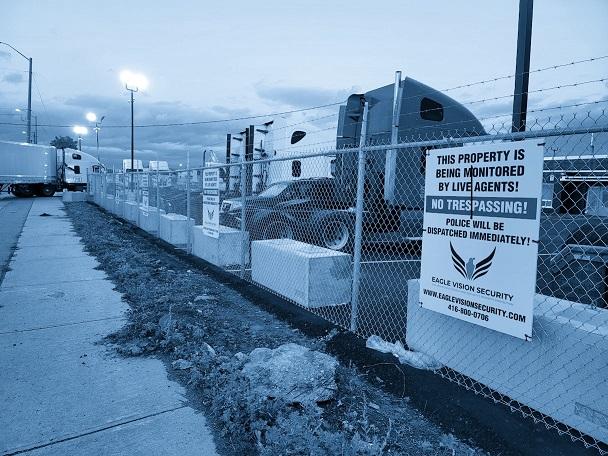Introduction
Truck yards are vital hubs in the transportation and logistics industry. They serve as parking, storage, and operational points for fleets, making them prime targets for theft, vandalism, and unauthorized activities. With millions of dollars’ worth of goods and vehicles often concentrated in one area, ensuring effective truck yard security is not just a precaution—it’s a necessity. A strong security plan safeguards company assets, protects employees, and maintains the smooth flow of operations.
In this article, we will discuss the importance of truck yard security, common threats, and the best strategies to implement comprehensive protection.
Why Truck Yard Security Matters
Truck yards often contain:
-
Loaded trailers carrying high-value goods
-
Fuel supplies and maintenance equipment
-
Heavy-duty trucks and machinery
Criminals see truck yards as opportunities because of the high concentration of assets. A single breach can result in financial losses, insurance complications, reputational damage, and even delays in supply chains. Moreover, unsecured truck yards can put drivers and staff at risk.
Investing in security measures not only prevents theft but also helps businesses comply with safety regulations and improves overall operational efficiency.
Common Threats in Truck Yards
To build strong defenses, it’s important to understand the threats truck yards face. Some of the most common include:
-
Cargo Theft – Criminals target trailers filled with electronics, pharmaceuticals, or consumer goods.
-
Vehicle Theft – Trucks, trailers, and even smaller service vehicles can be stolen.
-
Fuel Theft – Unsecured fuel tanks are attractive for thieves looking to siphon diesel.
-
Vandalism – Trespassers may damage equipment or vehicles, resulting in costly repairs.
-
Unauthorized Access – Without proper controls, intruders or unverified personnel can enter restricted zones.
-
Cyber Threats – Modern truck yards using digital management systems may face hacking attempts on surveillance or access control systems.
Key Elements of Effective Truck Yard Security
To address these threats, trucking companies need a multi-layered security strategy. Below are the essential components of an effective truck yard security system.
1. Perimeter Security
-
Fencing & Gates: Strong fencing with anti-climb features and electronically controlled gates keeps unauthorized individuals out.
-
Barriers: Bollards and barriers can prevent vehicle-based intrusions.
2. Access Control Systems
-
Badge or Key Card Systems: Only authorized employees and drivers can enter specific areas.
-
Biometric Verification: Advanced truck yards use fingerprint or facial recognition for added security.
-
Visitor Management: Recording and monitoring visitors reduces risks of unauthorized entry.
3. Surveillance Technology
-
CCTV Cameras: High-resolution cameras with night vision and motion detection should cover all entry/exit points, parking areas, and storage zones.
-
Remote Monitoring: Security staff or third-party monitoring services can watch footage in real-time.
-
License Plate Recognition (LPR): Helps track vehicle movements and identify suspicious activities.
4. Lighting and Visibility
-
LED Floodlights: Proper illumination reduces hiding spots and deters intruders.
-
Motion-Activated Lighting: Saves energy while ensuring instant visibility when activity is detected.
5. Security Personnel
-
On-Site Guards: Trained personnel provide an immediate response to suspicious activity.
-
Patrols: Regular patrols, both on foot and in vehicles, ensure full yard coverage.
-
K9 Units: Guard dogs add an extra layer of deterrence.
6. Alarm and Response Systems
-
Intrusion Alarms: Trigger alerts when someone tries to breach restricted areas.
-
Panic Buttons: Staff can quickly signal emergencies.
-
Integration with Local Authorities: Direct links to police or private response teams reduce response time.
Advanced Technologies in Truck Yard Security
The logistics industry is increasingly adopting smart technologies to enhance security. Some of these include:
-
Drones: Equipped with cameras and sensors, drones can provide aerial surveillance of large yards.
-
IoT Sensors: Detect unauthorized movements, tampering, or environmental changes like fire or smoke.
-
AI Analytics: Intelligent systems analyze camera footage to detect unusual patterns, reducing reliance on human monitoring.
-
GPS Tracking: Trucks and trailers can be tracked in real-time, reducing the chances of theft.
Best Practices for Truck Yard Security
Technology alone is not enough. Businesses must adopt policies and procedures to strengthen overall protection:
-
Regular Security Audits: Evaluate existing systems and identify gaps.
-
Employee Training: Staff should be trained to recognize suspicious activity and follow security protocols.
-
Controlled Parking: Assign designated zones for trucks and trailers, making it easier to monitor movements.
-
Two-Factor Authentication: Combine access cards with PIN codes or biometrics for sensitive areas.
-
Incident Reporting System: Encourage employees to report irregularities immediately.
-
Emergency Preparedness: Have evacuation, fire safety, and theft-response plans ready.
Benefits of Strong Truck Yard Security
When truck yards implement robust security systems, companies enjoy multiple benefits:
-
Reduced risk of theft and financial loss
-
Lower insurance premiums due to strong risk management
-
Improved employee confidence and safety
-
Better operational efficiency with controlled access
-
Enhanced reputation as a reliable logistics provider
Conclusion
Truck yard security is no longer optional—it’s a business-critical investment. With rising threats in the logistics industry, companies must combine traditional security measures with advanced technologies and proactive policies. By securing perimeters, controlling access, implementing surveillance, and training staff, businesses can ensure their assets remain safe and their operations run smoothly.
A well-protected truck yard is not just about preventing theft—it’s about building a culture of safety, trust, and reliability in the transportation industry.


